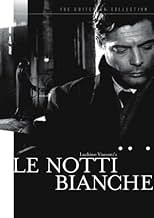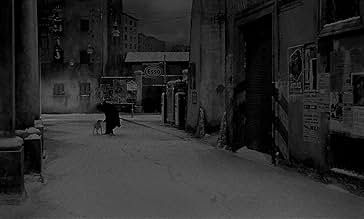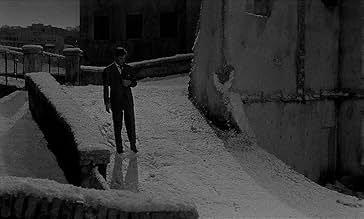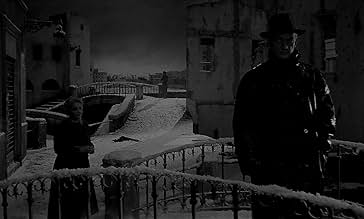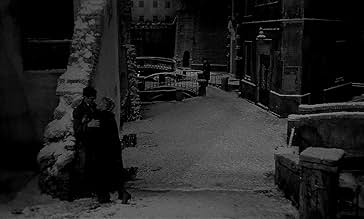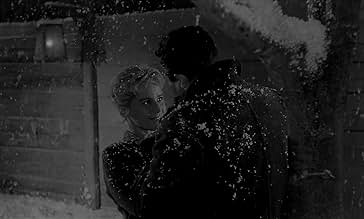IMDb-BEWERTUNG
7,7/10
9774
IHRE BEWERTUNG
Ein bescheidener Angestellter wirbt um eine Frau, die Nacht für Nacht auf die Rückkehr ihres Geliebten wartet.Ein bescheidener Angestellter wirbt um eine Frau, die Nacht für Nacht auf die Rückkehr ihres Geliebten wartet.Ein bescheidener Angestellter wirbt um eine Frau, die Nacht für Nacht auf die Rückkehr ihres Geliebten wartet.
- Regie
- Drehbuch
- Hauptbesetzung
- Auszeichnungen
- 7 Gewinne & 7 Nominierungen insgesamt
Maria Zanoli
- La domestica
- (as Maria Zanolli)
Dirk Sanders
- Il ballerino
- (as Dick Sanders)
Giorgio Albertazzi
- L'inquilino
- (Nicht genannt)
- …
Lys Assia
- La cantante
- (Nicht genannt)
Romano Barbieri
- Il figlio della famiglia amica di Mario
- (Nicht genannt)
Alberto Carloni
- Il locandiere
- (Nicht genannt)
Dino D'Aquilio
- Un ragazzino
- (Nicht genannt)
Enzo Doria
- Il marinaio che balla
- (Nicht genannt)
Empfohlene Bewertungen
This film is very good indeed. Visconti confirms what everybody knows: he is a master! The plot is based on a Dostoievski tale, where a love triangle is explored in the minimum psychological details. Actually, it shows the impact of a powerful passion on human behavior, it tries to explore the incredible power that love has on people's behavior, mainly when passion and irresistible attraction are present. The author tries to show that we are capable of believing anything as well as having childish attitudes when we are confronted with passion. Moreover Visconti is very elegant when dealing with all the elements, combining them with great precision.
Also it is fine to see Maria Schell and Mastroianni acting.
Also it is fine to see Maria Schell and Mastroianni acting.
Fyodor Dostoyevsky is a writer I've gotten into heavily recently, and I couldn't be happier to have seen Luchino Visconti's adaptation of his short story (not yet read by me) as the first. The very essential, human search for happiness with a one true love, that those who may not have much money may at least find some kind of relief from the world in each other's company, is at the heart of Dostoyevksy's stories. And while often filled with sorrow, decay, and with enough melodrama to sink a ship, this spirit is then given catharsis when the good that comes in through the dark times it's something to really cling to. Visconti has his own style already taking on Dostoyevsky's work, and I wondered going into it if the director of another great adaptation, Ossessione, could pull it off. For me, it may even be better than that film; Le Notti Bianche gives us characters who are not overly complicated or with nefarious desires. If anything, these are the kinds of characters that I wish were in movies more often, flaws and all.
Marcello Mastroianni is also, for me, a really pleasant surprise seeing him in this film. Regrettably the only films I've seen him in are the early ones he made with Fellini, where his persona is cool, detached, and he could do his ultra suave &/or depressed and unchained characters effortlessly. With the character of Mario, Mastroianni is playing just an ordinary guy, with a low paying job and nothing special going for him in life. But if nothing else he is what most women in real life would look for in men, with compassion, sensitivity, but also sensible and with some of the minor flaws of being a nice guy. With the character of Natalia, Mario meets a woman whom he falls for hard, and wants to see again after a chance encounter. Maria Schnell is perfect against Mastroianni, as she has that kind of face and look in her eye (for lack of a better comparison) of any given American melodrama, only a bit more genuine. She's basically been waiting, as she tells, for a year for the man who will whisk her away from all of her troubles. But will he? Will Mario come through on a letter? What happens through the course of an unsure night?
Visconti poises these two against a backdrop completely staged, brilliantly in fact, and shot by the great Giussepe Rotunno with the kind of visual splendor that in its own way is on par with Visconti's the Leopard. It's not filmed in the real world, and the melodrama in the film is that of a very cinematic- or maybe theatrical- nature, but because it's an ultimately believable one the atmosphere gets heightened. Topped with Nino Rota's elegant score, many a wide shot shows Mario and Natalia on their walks along the streets, and then the close-ups work just as well. Best of all is a quasi ice breaker of Visconti's by doing a dance number in a bar, adding a sweet, if dated, levity that acts as the last mark before the story turns, and turns some more. What drew me in most about Le Notti Bianchi is how Visconti makes this a story of pure emotions, but one that is not at all sappy or trashy or whatever. Like with many of Dostoyevsky's characters, even through their misguided wants and feelings and the sense of anguish that may come to them (or not), we care about them. If ever a director, who started in neo-realistic roots, took a 180 and made it just as dramatically satisfying, it's here. One of the best films of 1957.
Marcello Mastroianni is also, for me, a really pleasant surprise seeing him in this film. Regrettably the only films I've seen him in are the early ones he made with Fellini, where his persona is cool, detached, and he could do his ultra suave &/or depressed and unchained characters effortlessly. With the character of Mario, Mastroianni is playing just an ordinary guy, with a low paying job and nothing special going for him in life. But if nothing else he is what most women in real life would look for in men, with compassion, sensitivity, but also sensible and with some of the minor flaws of being a nice guy. With the character of Natalia, Mario meets a woman whom he falls for hard, and wants to see again after a chance encounter. Maria Schnell is perfect against Mastroianni, as she has that kind of face and look in her eye (for lack of a better comparison) of any given American melodrama, only a bit more genuine. She's basically been waiting, as she tells, for a year for the man who will whisk her away from all of her troubles. But will he? Will Mario come through on a letter? What happens through the course of an unsure night?
Visconti poises these two against a backdrop completely staged, brilliantly in fact, and shot by the great Giussepe Rotunno with the kind of visual splendor that in its own way is on par with Visconti's the Leopard. It's not filmed in the real world, and the melodrama in the film is that of a very cinematic- or maybe theatrical- nature, but because it's an ultimately believable one the atmosphere gets heightened. Topped with Nino Rota's elegant score, many a wide shot shows Mario and Natalia on their walks along the streets, and then the close-ups work just as well. Best of all is a quasi ice breaker of Visconti's by doing a dance number in a bar, adding a sweet, if dated, levity that acts as the last mark before the story turns, and turns some more. What drew me in most about Le Notti Bianchi is how Visconti makes this a story of pure emotions, but one that is not at all sappy or trashy or whatever. Like with many of Dostoyevsky's characters, even through their misguided wants and feelings and the sense of anguish that may come to them (or not), we care about them. If ever a director, who started in neo-realistic roots, took a 180 and made it just as dramatically satisfying, it's here. One of the best films of 1957.
A mythic, Venice-like city is an appropriate backdrop for a film which must have greatly offended European critics at the time who had thought of Visconti as one of the pioneers of the new realism in Italian Cinema (and indeed with Ossessione and La Terra Trema, he was!). But with this film Visconti seems to have changed his idea of what he wants in a film: instead of the pursuance of realism at all costs, we have a dream-like fairy tale about fairy tales.
Mario (Marcello Mastroianni) meets Natalia (Maria Schnell) one night, and is entranced. But as they begin to talk, over a couple of nights, he falls in love with her, and realises that she is already in love with another man. Maria is obsessed with a fairy-tale man (Jean Cocteau's leading man Jean Marais), who up and left her a year ago without explanation and said he would return in a year, and if she still loved him, he would be there for her.
This film is evocative and beautiful - i'd love to see it in a clean theatrical print - especially the snow scenes at the end.
Its a very satisfying cinema experience, and one of Visconti's most beautiful films. 8/10.
Highlights: the dancing scene! Snow scenes are beautiful, but the dancing scene stands head and shoulders above the rest of the movie. Marcello is shy and introverted - he is sitting in a night club with dreamy Natalia. When couples start getting up and busting some very cool moves to Bill Haley and the Comets' Thirteen Women, Mario becomes nervous and starts talking to her about himself, talking around the fact that he's a shy person and doesn't like dancing and physical things... he likes dreaming, solitude... But when he sees how interested Natalia is by another man pulling some mean dance moves, things change. Great scene.
Mario (Marcello Mastroianni) meets Natalia (Maria Schnell) one night, and is entranced. But as they begin to talk, over a couple of nights, he falls in love with her, and realises that she is already in love with another man. Maria is obsessed with a fairy-tale man (Jean Cocteau's leading man Jean Marais), who up and left her a year ago without explanation and said he would return in a year, and if she still loved him, he would be there for her.
This film is evocative and beautiful - i'd love to see it in a clean theatrical print - especially the snow scenes at the end.
Its a very satisfying cinema experience, and one of Visconti's most beautiful films. 8/10.
Highlights: the dancing scene! Snow scenes are beautiful, but the dancing scene stands head and shoulders above the rest of the movie. Marcello is shy and introverted - he is sitting in a night club with dreamy Natalia. When couples start getting up and busting some very cool moves to Bill Haley and the Comets' Thirteen Women, Mario becomes nervous and starts talking to her about himself, talking around the fact that he's a shy person and doesn't like dancing and physical things... he likes dreaming, solitude... But when he sees how interested Natalia is by another man pulling some mean dance moves, things change. Great scene.
This film is very good adaptation of the short novel of Fyodor Dostoevsky.Some days ago he saw "Lo Straniero" (the Stranger) adapted from the novel of Albert Camus.It seems that Luchino Visconti is fond of dramatic stories with complicated characters.
In this story we have all moments of feelings: sadness of Maria waiting on the bridge, joy when they go for dancind or when the snow is falling, anger when there was misunderstanding between them.
Other important thing: the photography is extraordinary: in this time Fellini, Visconti,Antonioni had the best cameramen of Italy !!
Finally the performances of Marcello Mastroianni and Maria Schell are excellent: they give strength to the film.
In some ways, "Le Notti Bianche" is a strange film for me. On one hand, it has some of the best cinematography you'll ever see in a black & white film. The composition, the lighting, the mist--it all is so perfect. Yet, on the other hand, the story itself is so slight that I felt very unfulfilled at its conclusion.
The film begins with a lonely man wandering about the waterfront late at night. Although you'd think a guy that looks like Marcello Mastroianni would not have trouble finding a relationship, but in this film he is quite alone. By chance, he meets a very strange woman (Maria Schell). She is VERY shy--and behaves a bit oddly. However, despite this, he vows to stop by the same place they met and see her, if she wants, the following night. From this very inauspicious beginning, two lonely people meet and form a friendship....and perhaps more. Eventually, you understand some of her weird behaviors--she's actually waiting for another man (Jean Marais)--a man who you assume will never come.
There really is NOT a lot more to the film than my description. It isn't a bad film but I wanted more. I liked Mastroianni's character (though he was a sad fellow) but found Schell's perplexing and hard to believe. I also thought their relationship a bit hard to believe as well--going from total strangers to talking about marriage WAY too fast. In fact, the story itself was only okay--but the film earns a 7 simply for its look. Not a particularly enjoyable or engaging film for me--and it receives a very, very mild recommendation from me.
The film begins with a lonely man wandering about the waterfront late at night. Although you'd think a guy that looks like Marcello Mastroianni would not have trouble finding a relationship, but in this film he is quite alone. By chance, he meets a very strange woman (Maria Schell). She is VERY shy--and behaves a bit oddly. However, despite this, he vows to stop by the same place they met and see her, if she wants, the following night. From this very inauspicious beginning, two lonely people meet and form a friendship....and perhaps more. Eventually, you understand some of her weird behaviors--she's actually waiting for another man (Jean Marais)--a man who you assume will never come.
There really is NOT a lot more to the film than my description. It isn't a bad film but I wanted more. I liked Mastroianni's character (though he was a sad fellow) but found Schell's perplexing and hard to believe. I also thought their relationship a bit hard to believe as well--going from total strangers to talking about marriage WAY too fast. In fact, the story itself was only okay--but the film earns a 7 simply for its look. Not a particularly enjoyable or engaging film for me--and it receives a very, very mild recommendation from me.
Wusstest du schon
- WissenswertesAustrian actress Maria Schell learnt the script in Italian and spoke all her lines in Italian during the shooting, which won her the admiration of the Italian cast and crew. It was subsequently decided not to dub her voice by an Italian actress, which was the usual practice at the time.
- Patzer(at around 4 mins) When the bar closes and the owner exits it, he pretends to take out keys from his pocket to lock the door. But, as the camera moves away, the actor portraying the owner of the bar, can be seen putting the keys back in his pocket without locking the door.
- VerbindungenEdited into Meine Schwester Maria (2002)
- SoundtracksThirteen Women
Written by Dicky Thompson (as Thomson), Gadda and Lidianni
Decca Records Inc. New York U.S.A.
Performed by Bill Haley and the Comets (as Bill Haley and His Comets)
Top-Auswahl
Melde dich zum Bewerten an und greife auf die Watchlist für personalisierte Empfehlungen zu.
- How long is White Nights?Powered by Alexa
Details
- Erscheinungsdatum
- Herkunftsländer
- Sprache
- Auch bekannt als
- White Nights
- Drehorte
- Produktionsfirmen
- Weitere beteiligte Unternehmen bei IMDbPro anzeigen
Box Office
- Weltweiter Bruttoertrag
- 6.497 $
- Laufzeit
- 1 Std. 37 Min.(97 min)
- Farbe
- Sound-Mix
- Seitenverhältnis
- 1.66 : 1
Zu dieser Seite beitragen
Bearbeitung vorschlagen oder fehlenden Inhalt hinzufügen

![Trailer [OV] ansehen](https://m.media-amazon.com/images/M/MV5BZDE1MmJhZTctZDhhNC00ZmYxLTgzYmQtODc4ZTE1YTM3NTAxXkEyXkFqcGdeQXRyYW5zY29kZS13b3JrZmxvdw@@._V1_QL75_UX500_CR0)
